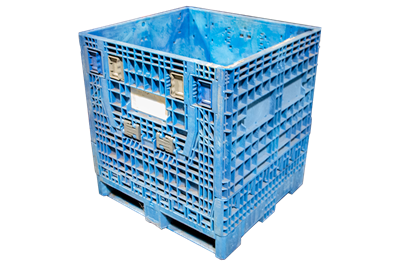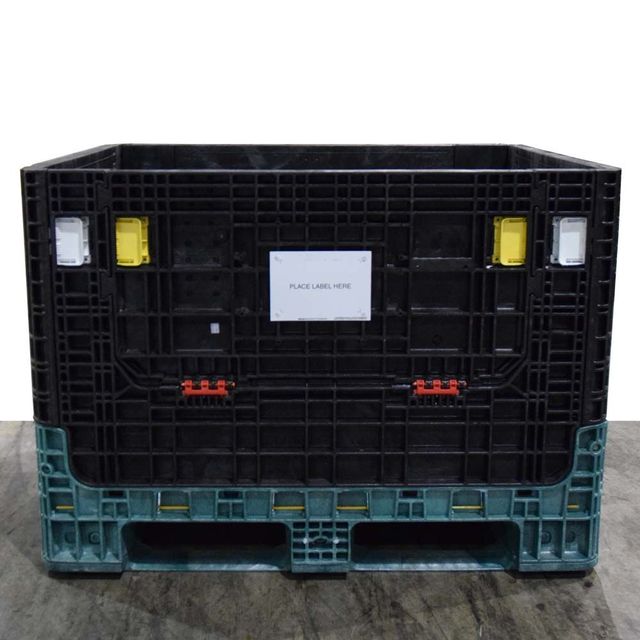Why Mass Containers Are Necessary for Economical and sustainable Transportation
Bulk containers play a necessary duty in contemporary logistics. They facilitate the efficient movement of large quantities of products, therefore optimizing transport procedures. This method not just lowers costs however likewise minimizes ecological impact via lower emissions and waste generation. As sectors look for even more lasting techniques, the adoption of bulk containers is becoming progressively considerable. What implications does this shift hold for future logistics and supply chain management?

The Benefits of Using Mass Containers in Logistics
Mass containers reinvent logistics by boosting performance and sustainability. These containers enable the transportation of large amounts of goods in a solitary journey, markedly lowering the variety of journeys called for. This not only simplifies operations however also minimizes labor prices connected with handling, packing, and dumping. Furthermore, mass containers are developed to maximize space usage within transportation automobiles, guaranteeing that even more products can be shipped all at once.
The standardization of bulk containers also streamlines the logistics procedure. With uniform dimensions, they can be easily stacked and saved, bring about improved stockroom management. In addition, mass containers often feature resilient products that protect contents from damages during transportation, therefore lowering item loss and enhancing total integrity. Therefore, companies can experience boosted supply chain performance, inevitably leading to boosted profitability and customer contentment. This mix of aspects makes bulk containers a crucial possession in modern logistics.
Environmental Impact: Minimizing Waste and Carbon Impact
As sectors progressively prioritize sustainability, the adoption of mass containers has become a key method for lowering waste and reducing carbon footprints. These containers decrease the use of product packaging materials, such as boxes and plastic, thereby notably lowering total waste generation. By settling deliveries, mass containers improve transport efficiency, enabling even more products to be carried per trip. This decrease in journeys straight correlates with lower greenhouse gas exhausts, adding to a smaller sized carbon impact.
In addition, mass containers can frequently be reused or recycled, additionally mitigating environmental effect. The longevity of these containers assurances they can stand up to several transportation cycles, lowering the need for single-use options. used bulk containers. By enhancing logistics and advertising efficient resource use, bulk containers not only support sustainable methods however also urge markets to straighten with international environmental goals. Eventually, their execution mirrors a dedication to environmental stewardship and accountable source administration
Price Financial Savings: How Bulk Containers Lower Transport Costs
While numerous companies seek methods to improve their profits, making use of bulk containers presents a considerable opportunity for lowering transport expenses. Mass containers take full advantage of the quantity of products transferred, permitting organizations to deliver larger amounts at once. This performance minimizes the variety of trips called for, straight decreasing fuel costs and decreasing labor expenditures linked with loading and discharging.
Additionally, mass containers often include streamlined designs that maximize room application within transport vehicles. This suggests less empty rooms, bring about a lot more efficient use of available ability. In addition, the longevity of mass containers can lower the threat of item damage throughout transportation, minimizing losses and making sure that even more items show up intact.
Enhancing Supply Chain Effectiveness With Mass Storage Solutions
Mass storage space solutions play a crucial role in improving supply chain performance by optimizing stock management. By settling items into fewer, larger containers, businesses can substantially reduce taking care of costs related to constant transfers and processing. This structured approach permits better tracking and administration of inventory, ultimately causing boosted functional performance.
Streamlined Stock Administration
Reliable inventory monitoring is necessary for enhancing supply chain procedures, especially when organizations embrace bulk storage remedies. These services make it possible for services to keep greater supply degrees while lessening the regularity of replenishment. By settling products right into mass containers, firms can simplify their stock processes, lowering the complexity related to tracking numerous smaller sized packages. This approach helps with precise stock counts and improves projecting precision, permitting more informed decision-making. On top of that, mass storage space services simplify warehouse organization, making it easier to locate and gain access to products when needed. As an outcome, organizations can attain a much more efficient supply turnover rate, inevitably improving overall supply chain efficiency and lowering the probability of stockouts or overstock situations.

Minimized Handling Prices
The implementation of mass storage space services not only simplifies inventory administration however likewise considerably decreases taking care of expenses throughout the supply chain. By consolidating materials right into mass containers, companies reduce the requirement for constant handling and transfer in between different storage space and transport units. This technique reduces down on labor costs connected with loading, dumping, and relocating smaller sized packages. In addition, mass storage decreases the regularity of deliveries, resulting in lower transport prices and decreased gas usage. As an outcome, organizations can maximize their logistics operations, permitting a more efficient allotment of sources. Eventually, minimized managing expenses add to improved total supply chain performance, cultivating a setting that sustains both sustainability and financial feasibility.

Flexibility of Bulk Containers Across Numerous Industries
Lots of markets have distinctive requirements for transportation and storage space, mass containers have emerged as a flexible solution that satisfies a vast range of requirements. These containers, varying from large bins to specialized storage tanks, can suit varied products, including granules, powders, and liquids. In the farming field, bulk containers assist in the transportation of fertilizers and grains, while the food and beverage industry utilizes them for components and completed items. The chemical industry counts on bulk containers click here for safely transporting dangerous materials, making sure conformity with safety and security regulations. Additionally, building and construction companies profit from bulk containers for transporting aggregates and other materials. Their flexibility encompasses different modes of transportation, including trains, ships, and trucks, enhancing logistical efficiency. This convenience not just streamlines operations throughout various industries but additionally advertises sustainability by decreasing packaging waste and optimizing room en route. As a result, mass containers play a crucial duty in contemporary supply chain administration.
Future Patterns wholesale Container Use and Sustainability
The future of bulk container usage is increasingly shaped by cutting-edge materials growth that improves sustainability. Additionally, automation in logistics assures to improve procedures, lowering waste and improving effectiveness. Embracing round economy methods will further reinvent exactly how bulk containers are designed, utilized, and reused, fostering a much more lasting transportation landscape.
Ingenious Products Development
As markets increasingly prioritize sustainability, cutting-edge materials advancement in mass containers arises as a considerable variable in enhancing eco-friendly transport options. Producers and researchers are checking out eco-friendly plastics, recycled compounds, and light-weight metals to lower ecological effect. These products not just reduce waste but likewise boost fuel effectiveness by reducing the total weight of containers. Additionally, developments in clever materials, which can adapt to varying conditions, improve the resilience and performance of bulk containers. The combination of these ingenious materials straightens with round economy principles, promoting reuse and recycling. As the demand for sustainable practices expands, the growth of such products will certainly play an essential role fit the future of mass container use in logistics and transportation.
Automation in Logistics
Significant developments in automation are positioned to change logistics and the application of mass containers, enhancing sustainability in transportation. Automated systems, including drones and autonomous cars, are improving the motion of bulk containers, minimizing the dependence on typical fuel-powered transportation. These modern technologies maximize transmitting and loading processes, reducing empty miles and enhancing gas performance. In addition, automated supply administration systems improve monitoring and tracking of mass containers, guaranteeing better resource allowance and decreased waste. The combination of the Web of Points (IoT) enables real-time data evaluation, allowing proactive decision-making that straightens with sustainability goals. As automation remains to progress, it is expected to drive additionally advancements in mass container use, eventually sustaining more lasting logistics methods and lowering the environmental impact of transport.
Circular Economic Situation Practices
Advancements in automation are setting the phase for a more integrated approach to round economic situation methods in the domain name of bulk container use. As industries significantly accept sustainability, mass containers are being developed for long life and reusability. This shift not just minimizes waste yet also enhances resource effectiveness. Business are adopting methods such as closed-loop systems, where made use of containers are collected, refurbished, and reestablished right into the supply chain. Additionally, wise technologies track container life cycles, assisting in better administration and decreasing ecological influence. The collaboration between producers, logistics service providers, and end-users is necessary in developing standards for sustainable container use. used collapsible bulk containers. Future trends indicate an expanding focus on materials that are biodegradable and recyclable, more reinforcing the circular economic climate's principles wholesale transportation

Often Asked Inquiries
What Products Are Bulk Containers Usually Made From?
Bulk containers are normally constructed from durable materials such as high-density polyethylene, light weight aluminum, cardboard, and steel. These materials offer versatility, security, and toughness, making them suitable for moving various products in various industries effectively.
How Do I Select the Right Dimension Mass Container?
Picking the appropriate size bulk container includes assessing the quantity of products to be transferred, thinking about handling devices compatibility, and evaluating storage room requirements. Appropriate dimension warranties efficiency in transport and decreases waste throughout shipment.
Are Mass Containers Reusable or Recyclable?
Bulk containers are typically reusable, developed for multiple journeys, improving sustainability. Several can also be recycled, relying on the products utilized. Choosing recyclable options better decreases and supports ecological goals waste in transportation techniques.
What Security Rules Relate To Mass Container Transport?
Security guidelines for mass container transport include compliance with the Department of Transportation guidelines, correct labeling of harmful materials, architectural stability assessments, and adherence to weight restrictions to ensure safe handling and protect against mishaps during transportation.
Exactly How Can Companies Change to Utilizing Mass Containers Successfully?
Businesses can transform to bulk containers by assessing existing logistics, training personnel on handling, buying ideal devices, optimizing stock monitoring, and working together with suppliers to ensure compatibility and performance throughout the supply chain.
As industries significantly prioritize sustainability, the adoption of mass containers has emerged as a crucial strategy for lowering waste and lowering carbon footprints. By combining materials into mass containers, firms can improve their stock procedures, reducing the complexity associated with tracking several smaller sized plans. As industries progressively focus on sustainability, cutting-edge products development in bulk containers emerges as a substantial factor in improving green transportation services. Automated systems, consisting of drones and self-governing lorries, are streamlining the movement of bulk containers, lowering the reliance on standard fuel-powered transport. Furthermore, automated supply administration systems boost tracking and monitoring of mass containers, ensuring better source allotment and decreased waste.